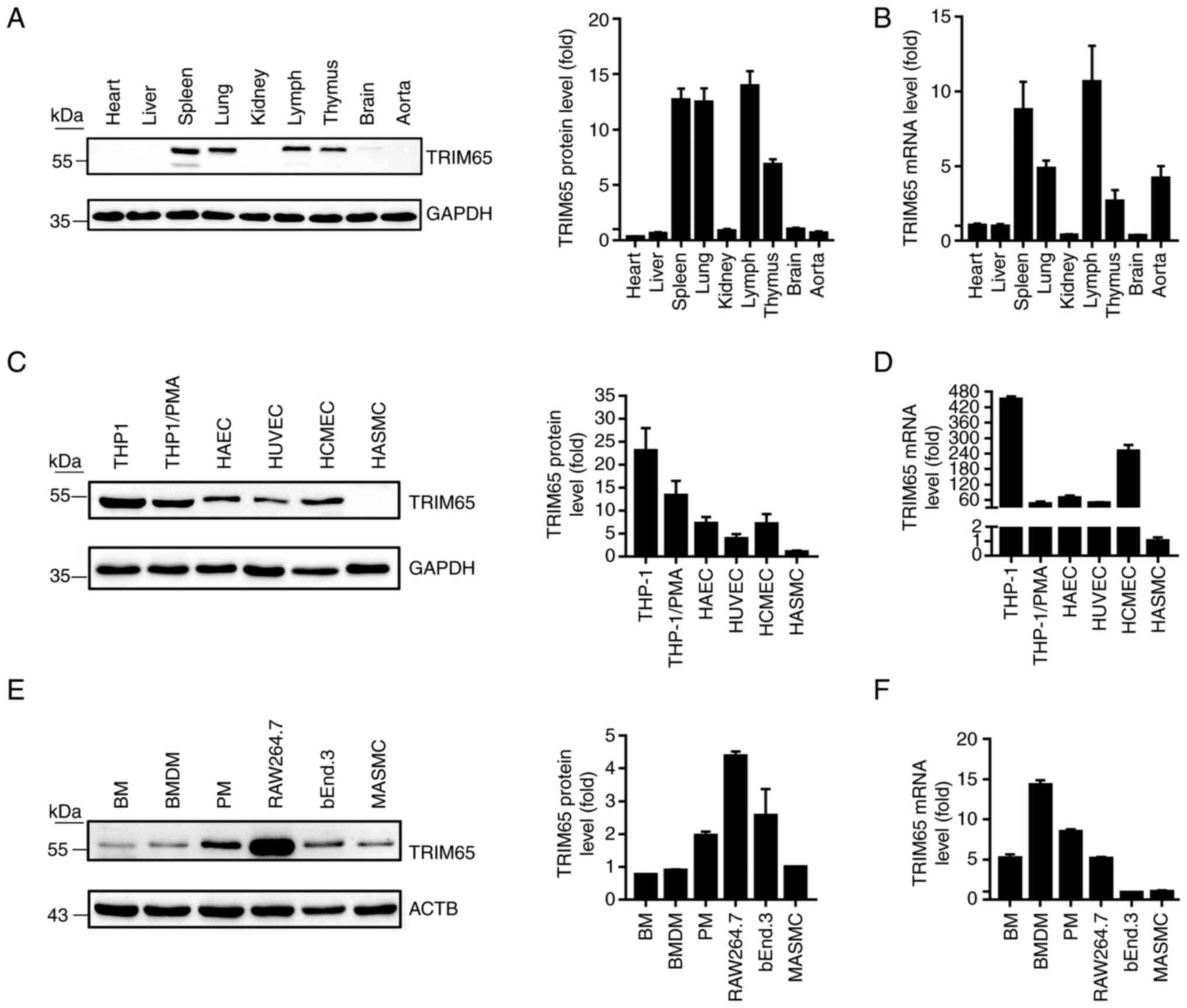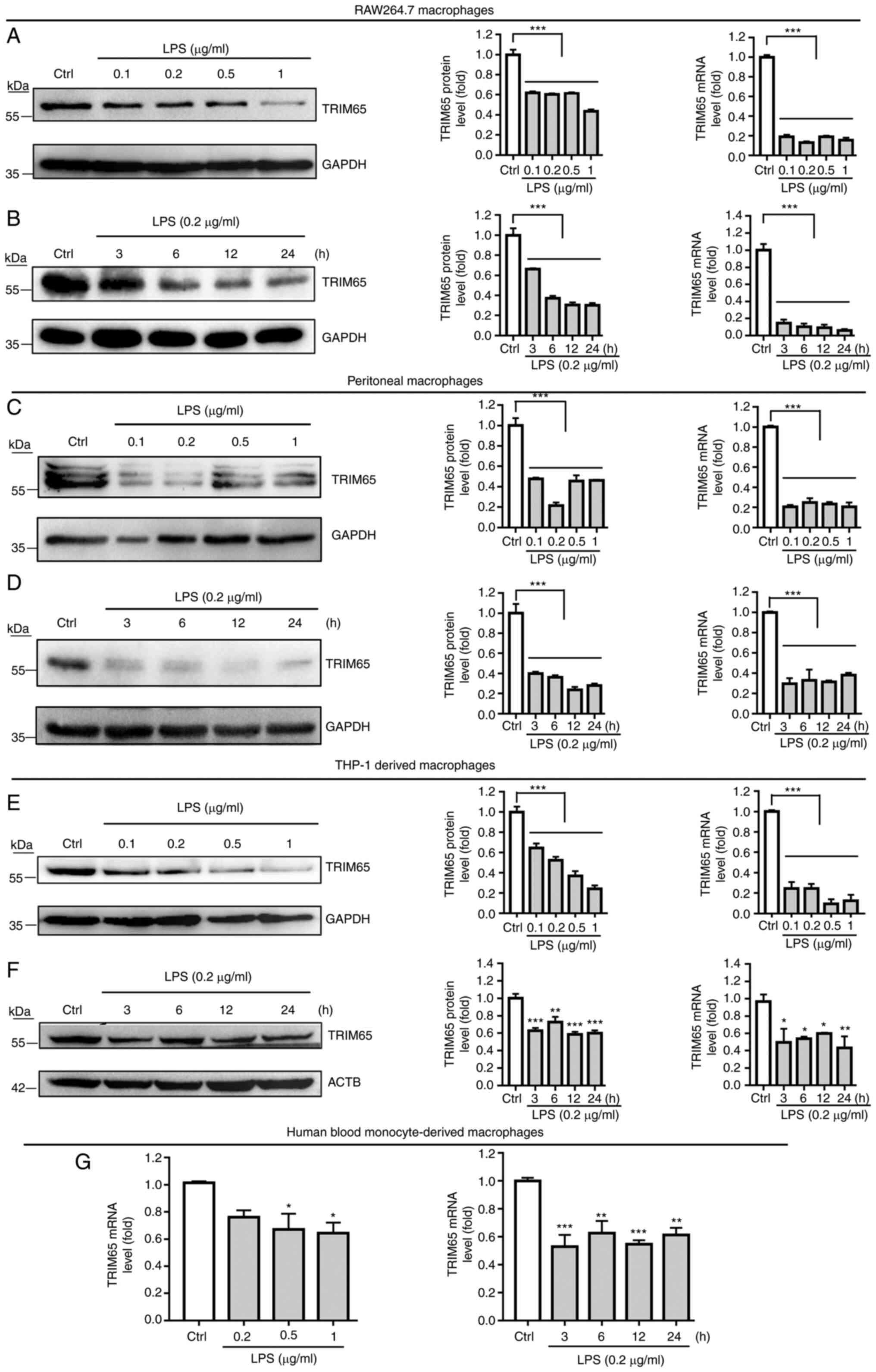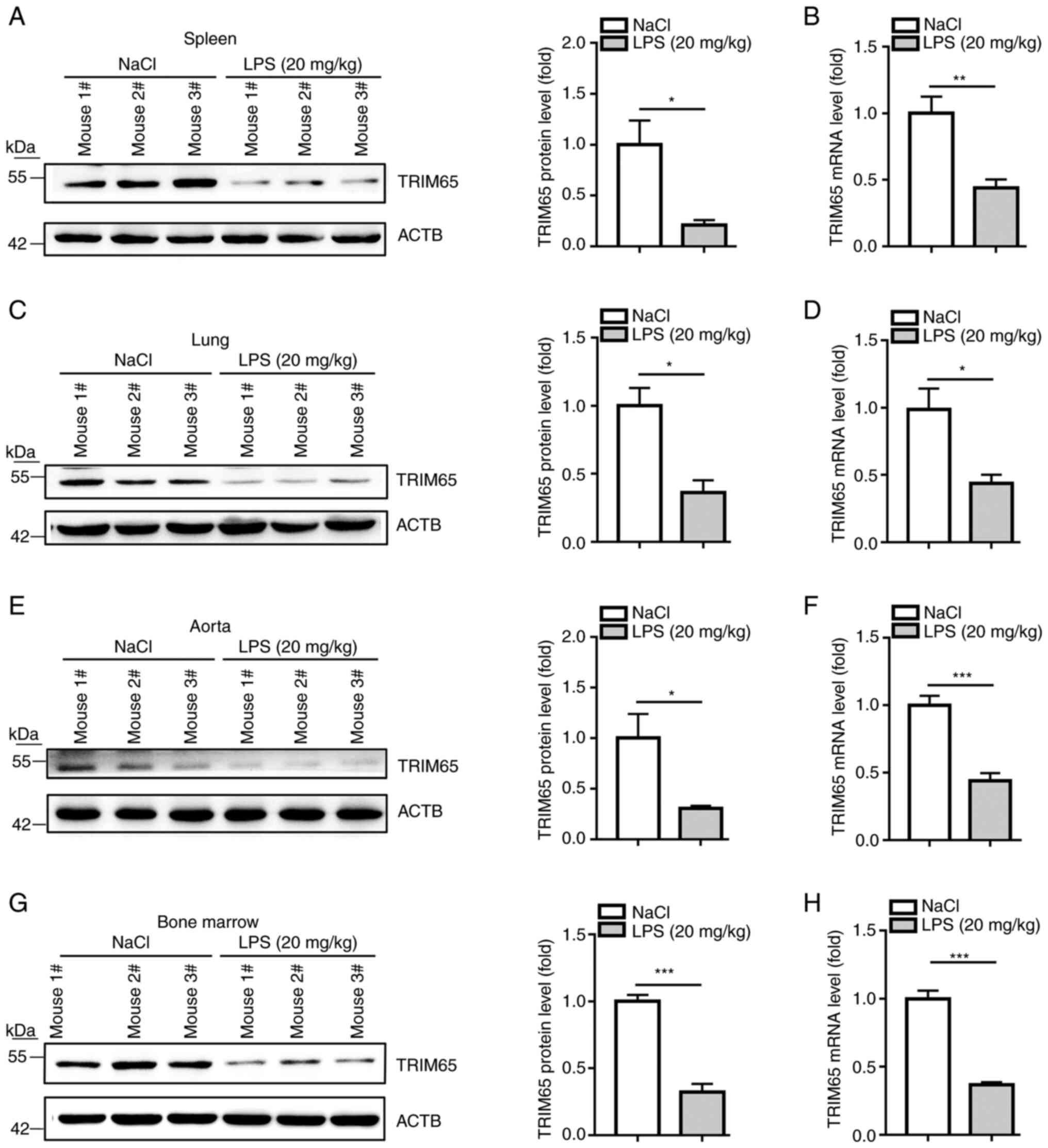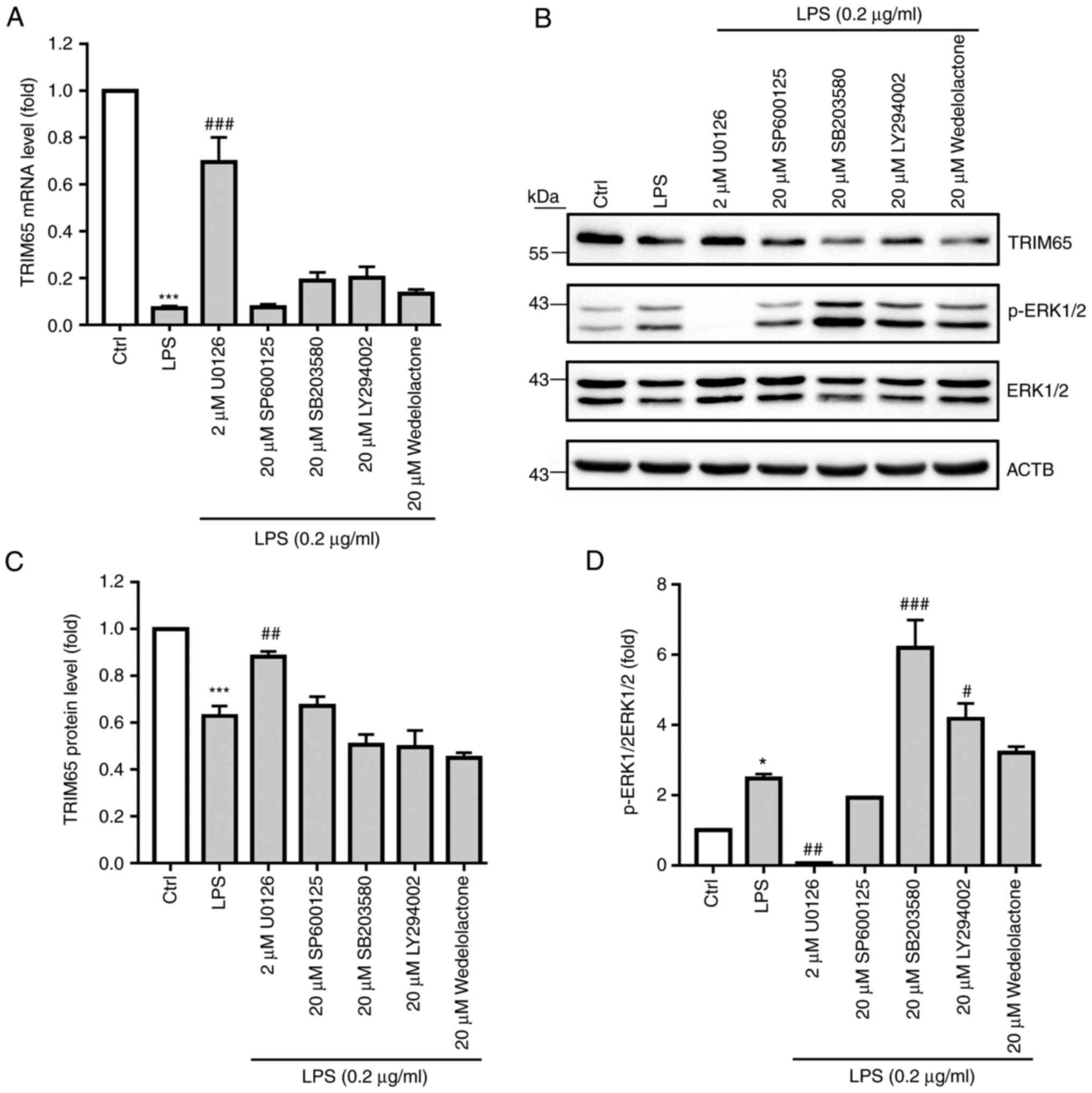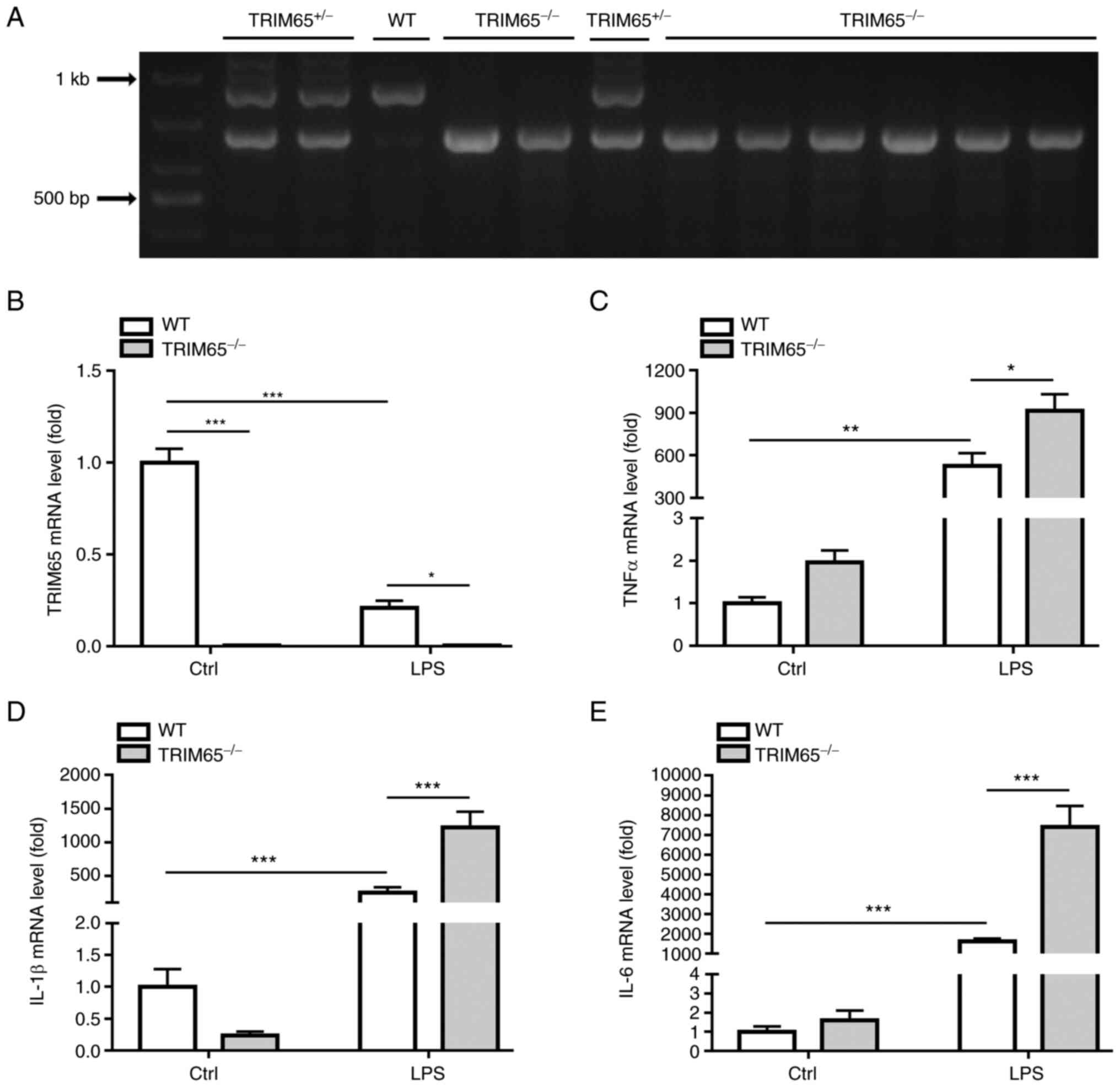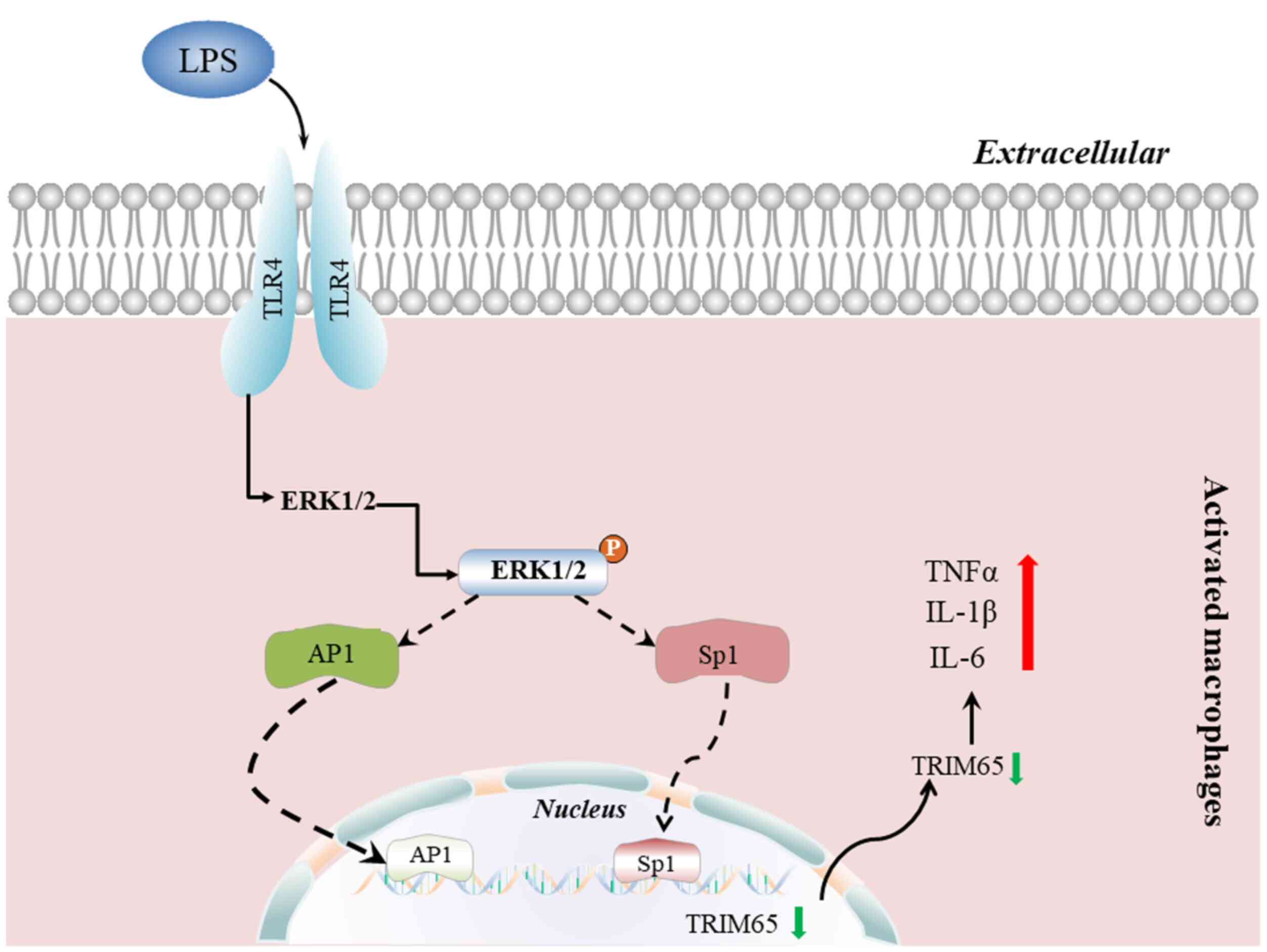|
1
|
An Y, Ni Y, Xu Z, Shi S, He J, Liu Y, Deng
K, Fu M, Jiang M and Xin HB: TRIM59 expression is regulated by Sp1
and Nrf1 in LPS-activated macrophages through JNK signaling
pathway. Cell Signal. 67(109522)2020.PubMed/NCBI View Article : Google Scholar
|
|
2
|
Jiang MX, Hong X, Liao BB, Shi SZ, Lai XF,
Zheng HY, Xie L, Wang Y, Wang XL, Xin HB, et al: Expression
profiling of TRIM protein family in THP1-derived macrophages
following TLR stimulation. Sci Rep. 7(42781)2017.PubMed/NCBI View Article : Google Scholar
|
|
3
|
Liu Z, Zhu H, Dai X, Wang C, Ding Y, Song
P and Zou MH: Macrophage liver kinase B1 inhibits foam cell
formation and atherosclerosis. Circ Res. 121:1047–1057.
2017.PubMed/NCBI View Article : Google Scholar
|
|
4
|
Shi Q, Cao J, Fang L, Zhao H, Liu Z, Ran
J, Zheng X, Li X, Zhou Y, Ge D, et al: Geniposide suppresses
LPS-induced nitric oxide, PGE2 and inflammatory cytokine by
downregulating NF-κB, MAPK and AP-1 signaling pathways in
macrophages. Int Immunopharmacol. 20:298–306. 2014.PubMed/NCBI View Article : Google Scholar
|
|
5
|
Yang J, Wise L and Fukuchi KI: TLR4
cross-talk with NLRP3 inflammasome and complement signaling
pathways in Alzheimer's disease. Front Immunol.
11(724)2020.PubMed/NCBI View Article : Google Scholar
|
|
6
|
Calder PC, Albers R, Antoine JM, Blum S,
Bourdet-Sicard R, Ferns GA, Folkerts G, Friedmann PS, Frost GS,
Guarner F, et al: Inflammatory disease processes and interactions
with nutrition. Br J Nutr. 101 (Suppl 1):S1–S45. 2009.PubMed/NCBI View Article : Google Scholar
|
|
7
|
Zhang L, Huang C, Guo Y, Gou X, Hinsdale
M, Lloyd P and Liu L: MicroRNA-26b modulates the NF-κB pathway in
alveolar macrophages by regulating PTEN. J Immunol. 195:5404–5414.
2015.PubMed/NCBI View Article : Google Scholar
|
|
8
|
Cargnello M and Roux PP: Activation and
function of the MAPKs and their substrates, the MAPK-activated
protein kinases. Microbiol Mol Biol Rev. 75:50–83. 2011.PubMed/NCBI View Article : Google Scholar
|
|
9
|
Hatakeyama S: TRIM proteins and cancer.
Nat Rev Cancer. 11:792–804. 2011.PubMed/NCBI View Article : Google Scholar
|
|
10
|
Sang Y, Li Y, Song L, Alvarez AA, Zhang W,
Lv D, Tang J, Liu F, Chang Z, Hatakeyama S, et al: TRIM59 promotes
gliomagenesis by inhibiting TC45 dephosphorylation of STAT3. Cancer
Res. 78:1792–1804. 2018.PubMed/NCBI View Article : Google Scholar
|
|
11
|
Ozato K, Shin DM, Chang TH and Morse HC
III: TRIM family proteins and their emerging roles in innate
immunity. Nat Rev Immunol. 8:849–860. 2008.PubMed/NCBI View Article : Google Scholar
|
|
12
|
Li Y, Ma C, Zhou T, Liu Y, Sun L and Yu Z:
TRIM65 negatively regulates p53 through ubiquitination. Biochem
Biophys Res Commun. 473:278–282. 2016.PubMed/NCBI View Article : Google Scholar
|
|
13
|
Yang YF, Zhang MF, Tian QH and Zhang CZ:
TRIM65 triggers β-catenin signaling via ubiquitylation of Axin1 to
promote hepatocellular carcinoma. J Cell Sci. 130:3108–3115.
2017.PubMed/NCBI View Article : Google Scholar
|
|
14
|
Wei WS, Chen X, Guo LY, Li XD, Deng MH,
Yuan GJ, He LY, Li YH, Zhang ZL, Jiang LJ, et al: TRIM65 supports
bladder urothelial carcinoma cell aggressiveness by promoting ANXA2
ubiquitination and degradation. Cancer Lett. 435:10–22.
2018.PubMed/NCBI View Article : Google Scholar
|
|
15
|
Chen D, Li Y, Zhang X, Wu H, Wang Q, Cai
J, Cui Y, Liu H, Lan P, Wang J, et al: Ubiquitin ligase TRIM65
promotes colorectal cancer metastasis by targeting ARHGAP35 for
protein degradation. Oncogene. 38:6429–6444. 2019.PubMed/NCBI View Article : Google Scholar
|
|
16
|
Meng J, Yao Z, He Y, Zhang R, Zhang Y, Yao
X, Yang H, Chen L, Zhang Z, Zhang H, et al: ARRDC4 regulates
enterovirus 71-induced innate immune response by promoting K63
polyubiquitination of MDA5 through TRIM65. Cell Death Dis.
8(e2866)2017.PubMed/NCBI View Article : Google Scholar
|
|
17
|
Lang X, Tang T, Jin T, Ding C, Zhou R and
Jiang W: TRIM65-catalized ubiquitination is essential for
MDA5-mediated antiviral innate immunity. J Exp Med. 214:459–473.
2017.PubMed/NCBI View Article : Google Scholar
|
|
18
|
Li S, Wang L, Fu B, Berman MA, Diallo A
and Dorf ME: TRIM65 regulates microRNA activity by ubiquitination
of TNRC6. Proc Natl Acad Sci USA. 111:6970–6975. 2014.PubMed/NCBI View Article : Google Scholar
|
|
19
|
Li Y, Huang X, Guo F, Lei T, Li S,
Monaghan-Nichols P, Jiang Z, Xin HB and Fu M: TRIM65 E3 ligase
targets VCAM-1 degradation to limit LPS-induced lung inflammation.
J Mol Cell Biol. 12:190–201. 2020.PubMed/NCBI View Article : Google Scholar
|
|
20
|
Tang T, Li P, Zhou X, Wang R, Fan X, Yang
M and Qi K: The E3 ubiquitin ligase TRIM65 negatively regulates
inflammasome activation through promoting ubiquitination of NLRP3.
Front Immunol. 12(741839)2021.PubMed/NCBI View Article : Google Scholar
|
|
21
|
Yu M, Jiang M, Chen Y, Zhang S, Zhang W,
Yang X, Li X, Li Y, Duan S, Han J and Duan Y: Inhibition of
macrophage CD36 expression and cellular oxidized low density
lipoprotein (oxLDL) accumulation by tamoxifen: A peroxisome
proliferator-activated receptor (PPAR)γ-dependent mechanism. J Biol
Chem. 291:16977–16989. 2016.PubMed/NCBI View Article : Google Scholar
|
|
22
|
Lv XF, Zhang YJ, Liu X, Zheng HQ, Liu CZ,
Zeng XL, Li XY, Lin XC, Lin CX, Ma MM, et al: TMEM16A ameliorates
vascular remodeling by suppressing autophagy via inhibiting
Bcl-2-p62 complex formation. Theranostics. 10:3980–3993.
2020.PubMed/NCBI View Article : Google Scholar
|
|
23
|
Adhikari N, Shekar KC, Staggs R, Win Z,
Steucke K, Lin YW, Wei LN, Alford P and Hall JL: Guidelines for the
isolation and characterization of murine vascular smooth muscle
cells. A report from the international society of cardiovascular
translational research. J Cardiovasc Transl Res. 8:158–163.
2015.PubMed/NCBI View Article : Google Scholar
|
|
24
|
Livak KJ and Schmittgen TD: Analysis of
relative gene expression data using real-time quantitative PCR and
the 2(-Delta Delta C(T)) method. Methods. 25:402–408.
2001.PubMed/NCBI View Article : Google Scholar
|
|
25
|
Björkegren JLM and Lusis AJ:
Atherosclerosis: Recent developments. Cell. 185:1630–1645.
2022.PubMed/NCBI View Article : Google Scholar
|
|
26
|
Chistiakov DA, Bobryshev YV, Nikiforov NG,
Elizova NV, Sobenin IA and Orekhov AN: Macrophage phenotypic
plasticity in atherosclerosis: The associated features and the
peculiarities of the expression of inflammatory genes (vol 184, pg
436, 2015). Int J Cardiol. 325(186)2021.PubMed/NCBI View Article : Google Scholar
|
|
27
|
Chinetti-Gbaguidi G, Colin S and Staels B:
Macrophage subsets in atherosclerosis. Nat Rev Cardiol. 12:10–17.
2015.PubMed/NCBI View Article : Google Scholar
|
|
28
|
Yang S, Yuan HQ, Hao YM, Ren Z, Qu SL, Liu
LS, Wei DH, Tang ZH, Zhang JF and Jiang ZS: Macrophage polarization
in atherosclerosis. Clin Chim Acta. 501:142–146. 2020.PubMed/NCBI View Article : Google Scholar
|
|
29
|
Barrett TJ: Macrophages in atherosclerosis
regression. Arterioscler Thromb Vasc Biol. 40:20–33.
2020.PubMed/NCBI View Article : Google Scholar
|
|
30
|
Shapouri-Moghaddam A, Mohammadian S,
Vazini H, Taghadosi M, Esmaeili SA, Mardani F, Seifi B, Mohammadi
A, Afshari JT and Sahebkar A: Macrophage plasticity, polarization,
and function in health and disease. J Cell Physiol. 233:6425–6440.
2018.PubMed/NCBI View Article : Google Scholar
|
|
31
|
Ruffell B and Coussens LM: Macrophages and
therapeutic resistance in cancer. Cancer Cell. 27:462–472.
2015.PubMed/NCBI View Article : Google Scholar
|
|
32
|
Chittezhath M, Dhillon MK, Lim JY, Laoui
D, Shalova IN, Teo YL, Chen JM, Kamaraj R, Raman L, Lum J, et al:
Molecular profiling reveals a tumor-promoting phenotype of
monocytes and macrophages in human cancer progression. Immunity.
41:815–829. 2014.PubMed/NCBI View Article : Google Scholar
|
|
33
|
Meshkani R and Vakili S: Tissue resident
macrophages: Key players in the pathogenesis of type 2 diabetes and
its complications. Clin Chim Acta. 462:77–89. 2016.PubMed/NCBI View Article : Google Scholar
|
|
34
|
Kraakman MJ, Murphy AJ, Jandeleit-Dahm K
and Kammoun HL: Macrophage polarization in obesity and type 2
diabetes: Weighing down our understanding of macrophage function?
Front Immunol. 5(470)2014.PubMed/NCBI View Article : Google Scholar
|
|
35
|
Yunna C, Mengru H, Lei W and Weidong C:
Macrophage M1/M2 polarization. Eur J Pharmacol.
877(173090)2020.PubMed/NCBI View Article : Google Scholar
|
|
36
|
Wang XY, Mao HW, Guan XH, Huang QM, Yu ZP,
Wu J, Tan HL, Zhang F, Huang X, Deng KY and Xin HB: TRIM65 promotes
cervical cancer through selectively degrading p53-mediated
inhibition of autophagy and apoptosis. Front Oncol.
12(853935)2022.PubMed/NCBI View Article : Google Scholar
|
|
37
|
Libby P, Buring JE, Badimon L, Hansson GK,
Deanfield J, Bittencourt MS, Tokgözoğlu L and Lewis EF:
Atherosclerosis. Nat Rev Dis Primers. 5(56)2019.PubMed/NCBI View Article : Google Scholar
|
|
38
|
Tanikawa T, Kitamura M, Hayashi Y, Tomida
N, Uwaya A, Isami F and Inoue Y: Anti-inflammatory effects of
morinda citrifolia extract against lipopolysaccharide-induced
inflammation in RAW264 cells. Medicines (Basel).
8(43)2021.PubMed/NCBI View Article : Google Scholar
|
|
39
|
Zhao K, Song X, Huang Y, Yao J, Zhou M, Li
Z, You Q, Guo Q and Lu N: Wogonin inhibits LPS-induced tumor
angiogenesis via suppressing PI3K/Akt/NF-κB signaling. Eur J
Pharmacol. 737:57–69. 2014.PubMed/NCBI View Article : Google Scholar
|
|
40
|
Fu SP, Li SN, Wang JF, Li Y, Xie SS, Xue
WJ, Liu HM, Huang BX, Lv QK, Lei LC, et al: BHBA suppresses
LPS-induced inflammation in BV-2 cells by inhibiting NF-κB
activation. Mediators Inflamm. 2014(983401)2014.PubMed/NCBI View Article : Google Scholar
|
|
41
|
Atsaves V, Leventaki V, Rassidakis GZ and
Claret FX: AP-1 transcription factors as regulators of immune
responses in cancer. Cancers (Basel). 11(1037)2019.PubMed/NCBI View Article : Google Scholar
|
|
42
|
Bouwman P and Philipsen S: Regulation of
the activity of Sp1-related transcription factors. Mol Cell
Endocrinol. 195:27–38. 2002.PubMed/NCBI View Article : Google Scholar
|
|
43
|
Chu S: Transcriptional regulation by
post-transcriptional modification-role of phosphorylation in Sp1
transcriptional activity. Gene. 508:1–8. 2012.PubMed/NCBI View Article : Google Scholar
|
|
44
|
Young MJ, Chen YC, Wang SA, Chang HP, Yang
WB, Lee CC, Liu CY, Tseng YL, Wang YC, Sun HS, et al:
Estradiol-mediated inhibition of Sp1 decreases miR-3194-5p
expression to enhance CD44 expression during lung cancer
progression. J Biomed Sci. 29(3)2022.PubMed/NCBI View Article : Google Scholar
|
|
45
|
Chuang JY, Wang YT, Yeh SH, Liu YW, Chang
WC and Hung JJ: Phosphorylation by c-Jun NH2-terminal kinase 1
regulates the stability of transcription factor Sp1 during mitosis.
Mol Biol Cell. 19:1139–1151. 2008.PubMed/NCBI View Article : Google Scholar
|
|
46
|
Wang YT, Chuang JY, Shen MR, Yang WB,
Chang WC and Hung JJ: Sumoylation of specificity protein 1 augments
its degradation by changing the localization and increasing the
specificity protein 1 proteolytic process. J Mol Biol. 380:869–885.
2008.PubMed/NCBI View Article : Google Scholar
|
|
47
|
Kim HS and Lim IK: Phosphorylated
extracellular signal-regulated protein kinases 1 and 2
phosphorylate Sp1 on serine 59 and regulate cellular senescence via
transcription of p21Sdi1/Cip1/Waf1. J Biol Chem. 284:15475–15486.
2009.PubMed/NCBI View Article : Google Scholar
|
|
48
|
Lin HH, Lai SC and Chau LY: Heme
oxygenase-1/carbon monoxide induces vascular endothelial growth
factor expression via p38 kinase-dependent activation of Sp1. J
Biol Chem. 286:3829–3838. 2011.PubMed/NCBI View Article : Google Scholar
|















